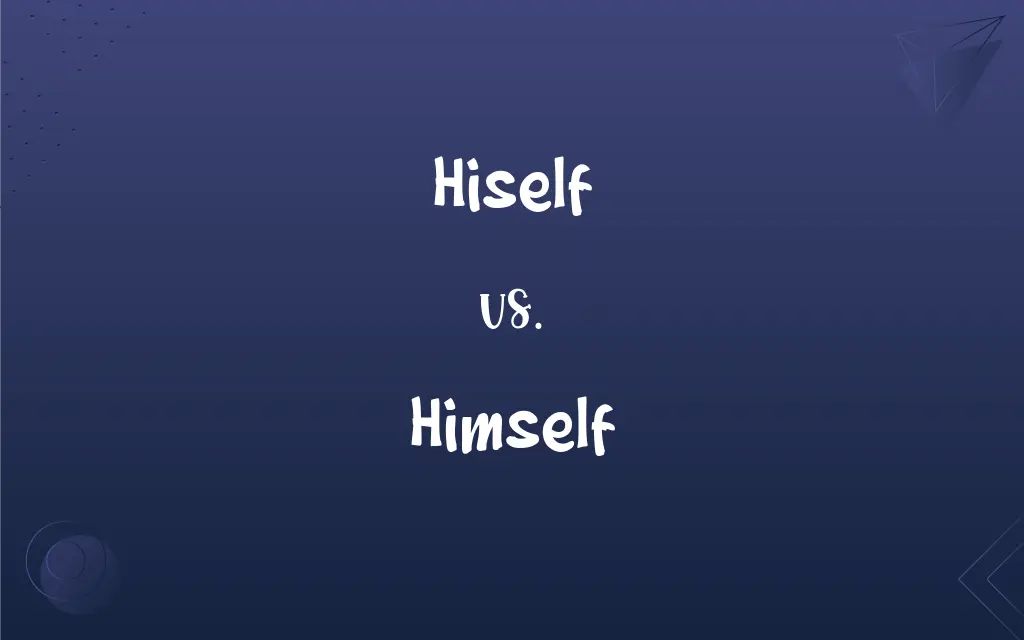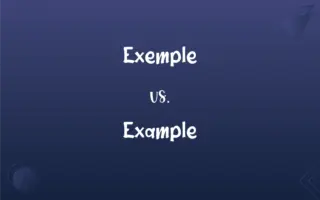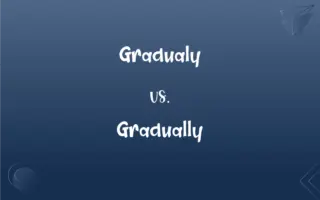Hiself vs. Himself: Mastering the Correct Spelling
Edited by Harlon Moss || By Janet White || Updated on March 11, 2024
"Hiself" is a common misspelling. The correct term is "Himself," used to refer to a male subject previously mentioned.

Which is correct: Hiself or Himself
How to spell Himself?

Hiself is Incorrect

Himself is Correct
ADVERTISEMENT
Key Differences
Recall that "him" refers to a male; adding "self" emphasizes it's about him only.
"Himself" matches the structure of "herself" and "itself."
Imagine a sentence: "He did it by himself."
Think of it as a combination of "him" and "self."
Note the absence of "e" after "him."
ADVERTISEMENT
Correct usage of Himself
John was proud of hiself for winning the award.
John was proud of himself for winning the award.
He bought a gift for hiself on his birthday.
He bought a gift for himself on his birthday.
He learned to tie his shoes by hiself.
He learned to tie his shoes by himself.
He said he could do it all by hiself.
He said he could do it all by himself.
He made lunch for hiself.
He made lunch for himself.
Himself Definitions
A reflexive form of "he."
He hurt himself while playing.
For emphasis, indicating the male subject of the verb.
The manager himself approved it.
In an absolute construction.
Even with his friends helping, himself being the strongest pulled the weight.
Used for emphasis.
He baked the cookies himself.
(reflexive pronoun) Him; the male object of a verb or preposition that also appears as the subject
He injured himself.
(emphatic) He; used as an intensifier, often to emphasize that the referent is the exclusive participant in the predicate
He was injured himself.
The subject or non-reflexive object of a predicate; he himself.
(Ireland) The subject or non-reflexive object of a predicate; he used of upper-class gentlemen, or sarcastically, of men who imagine themselves to be more important than others
Has himself come down to breakfast yet?
Have you seen himself yet this morning?
An emphasized form of the third person masculine pronoun; - used as a subject usually with he; as, he himself will bear the blame; used alone in the predicate, either in the nominative or objective case; as, it is himself who saved himself.
But he himself returned from the quarries.
David hid himself in the field.
The Lord himself shall give you a sign.
Who gave himself for us, that he might . . . purify unto himself a peculiar people.
With shame remembers, while himself was oneOf the same herd, himself the same had done.
It comprehendeth in himself all good.
One's true or real character; one's natural temper and disposition; the state of being in one's right or sane mind (after unconsciousness, passion, delirium, or abasement); as, the man has come to himself.
Themselves. See Hemself.
To indicate someone's own being or nature.
He was not himself today.
Himself Sentences
He built the bookshelf all by himself.
He likes to talk to himself when he's concentrating.
He considered himself lucky to have such friends.
The cat curled up beside him, purring contentedly to himself.
He hurt himself while playing soccer.
He taught himself how to play the guitar.
He made himself a promise to read more books.
He cooked dinner for himself last night.
He looked at himself in the mirror and smiled.
He often buys himself a little treat on Fridays.
He promised himself he would travel more.
He found himself lost in the book's complex world.
He keeps himself in good shape by exercising regularly.
He wrote himself a note so he wouldn't forget.
He saved himself a piece of cake for later.
He likes to think of himself as a handyman.
He has learned to rely on himself more.
He views himself as a guardian of tradition.
He gave himself a day off to relax.
He occasionally talks to himself to organize his thoughts.
He challenged himself to learn a new language.
He surprised himself by how much he enjoyed the concert.
He introduced himself to the new neighbors.
He considers himself a bit of an amateur chef.
He set a goal for himself to achieve by the end of the year.
Himself Idioms & Phrases
Get over himself
To stop thinking too highly of oneself; to be less self-absorbed.
He needs to get over himself and realize the world doesn't revolve around him.
Beside himself
To be in an extreme state of emotion, usually anxiety, excitement, or anger.
He was beside himself with joy when he found out he had won the lottery.
Keep himself to himself
To be introverted or private, avoiding social interaction.
He's a quiet person who generally keeps himself to himself.
Make a name for himself
To become famous or respected in a particular field.
He made a name for himself as a talented graphic designer.
Give himself away
To reveal one's true thoughts, feelings, or intentions, especially unintentionally.
He gave himself away with that nervous glance.
A law unto himself
Someone who behaves independently, ignoring rules and conventions.
John always does things his way; he's a law unto himself.
Fend for himself
To take care of oneself without assistance.
At college, he quickly learned to fend for himself.
By himself
Alone, without assistance or company.
He prefers to work by himself in the quiet library.
Prove himself
To demonstrate one's abilities or worth.
He felt he had to prove himself at his new job.
Pull himself together
To regain self-control or composure.
After the initial shock, he pulled himself together and addressed the situation.
To hear himself think
To be in a quiet or peaceful environment.
He went to the countryside to hear himself think.
For himself
Beneficial to or intended for oneself.
He bought the cake more for himself than for the guests.
To himself
In private; silently or within one's own mind.
He muttered the answer to himself, not wanting to share it out loud.
Think for himself
To make decisions or form opinions independently.
It's important that he learns to think for himself.
Better himself
To improve one's social or economic status.
He's always looking for opportunities to better himself.
Find himself
To discover one's true identity or preferences.
He went traveling around Asia to find himself.
Express himself
To communicate one's thoughts or feelings.
He uses music to express himself.
Hold himself accountable
To take responsibility for one's actions.
He holds himself accountable for his team's performance.
Reinvent himself
To completely change one's lifestyle or image.
After his career in finance, he reinvented himself as an artist.
FAQs
Why is it called Himself?
A: It is called "Himself" because it combines "him" (a masculine object pronoun) with "self" to refer reflexively to a male subject.
What is the root word of Himself?
A: The root word is "him."
What is the verb form of Himself?
A: "Himself" doesn't have a verb form as it's a pronoun.
What is the pronunciation of Himself?
A: "Himself" is pronounced as /hɪmˈsɛlf/.
What is the plural form of Himself?
A: The word "Himself" doesn't have a plural form, but analogous forms for multiple people are "themselves" or "selves."
Which conjunction is used with Himself?
A: Conjunctions aren't specific to pronouns. Any conjunction (e.g., and, but, or) can be used in a sentence containing "himself."
Is Himself a negative or positive word?
A: "Himself" is neutral; it's neither negative nor positive.
Which vowel is used before Himself?
A: The vowel "i" is used before "Himself."
Is Himself a noun or adjective?
A: "Himself" is a pronoun.
Is Himself a vowel or consonant?
A: "Himself" is a word, not a single letter. It contains both vowels and consonants.
Is Himself a countable noun?
A: No, "Himself" is a reflexive pronoun and not a countable noun.
What is the singular form of Himself?
A: "Himself" is already in singular form.
What part of speech is Himself?
A: "Himself" is a reflexive pronoun.
Which determiner is used with Himself?
A: Determiners aren't typically used directly with "Himself."
What is the third form of Himself?
A: "Himself" remains consistent and doesn't have different forms.
Which preposition is used with Himself?
A: Various prepositions can be used with "Himself," e.g., "by himself" or "for himself."
Which article is used with Himself?
A: Typically, articles aren't used directly before reflexive pronouns. However, in context, "the" or "a" might appear elsewhere in the sentence.
Is Himself an abstract noun?
A: No, "Himself" is a reflexive pronoun.
Is Himself a collective noun?
A: No, "Himself" is not a collective noun.
How do we divide Himself into syllables?
A: "Himself" can be divided as Him-self.
What is the first form of Himself?
A: "Himself" doesn't have forms like verbs do. It's always "Himself."
Is Himself an adverb?
A: No, "Himself" is not an adverb.
Is the Himself term a metaphor?
A: No, "Himself" is not a metaphor by itself. However, it can be used metaphorically in certain contexts.
How many syllables are in Himself?
A: "Himself" has two syllables.
What is the second form of Himself?
A: "Himself" doesn't have different forms.
How is Himself used in a sentence?
A: Example: He made the meal by himself.
Is the word Himself is imperative?
A: No, "Himself" is not imperative.
What is a stressed syllable in Himself?
A: The first syllable, "Him," is stressed in "Himself."
What is another term for Himself?
A: A similar term is "his own self."
What is the opposite of Himself?
A: The feminine form, which serves as an opposite in gender terms, is "herself."
About Author
Written by
Janet WhiteJanet White has been an esteemed writer and blogger for Difference Wiki. Holding a Master's degree in Science and Medical Journalism from the prestigious Boston University, she has consistently demonstrated her expertise and passion for her field. When she's not immersed in her work, Janet relishes her time exercising, delving into a good book, and cherishing moments with friends and family.
Edited by
Harlon MossHarlon is a seasoned quality moderator and accomplished content writer for Difference Wiki. An alumnus of the prestigious University of California, he earned his degree in Computer Science. Leveraging his academic background, Harlon brings a meticulous and informed perspective to his work, ensuring content accuracy and excellence.


































































